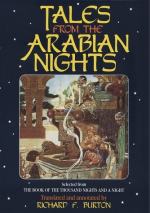to an Arab to suggest, as a matter of course, a bird’s
necklace, and hence the bird itself, we would probably
find a trace of this particular meaning, if not in
other Arabic books, at least in Persian writers or
dictionaries; but here the word “Rishah,”
by some pronounced “Reshah” with the Ya
majhul, never occurs in connection with jewels; it
means fringe, filament, fibre. On the other hand,
the suggestion of the bird presents itself quite naturally
at the sight of the feather. 3. Ib. p. 210 the
youth requests the old man to tell him concerning
the “Tayrah allazi Rish-ha (not Rishat-ha) min
Ma’adin,” which, I believe, can only be
rendered by: the bird whose plumage is of precious
stones. The “Rishah” itself was said
to be “min Zumurrud wa Lulu,” of emeralds
and pearls; and the cage will be “min Ma’adin
wa Lulu,” of precious stones and pearls, in all
which cases the use of the preposition “min”
points more particularly to the material of which
the objects are wrought than the mere Izafah.
The wonderfulness of the bird seems therefore rather
to consist in his jewelled plumage than the gift of
speech or other enchanting qualities, and I would
take it for one of those costly toys, in imitation
of trees and animals, in which Eastern princes rejoice,
and of which we read so many descriptions, not only
in books of fiction, but even in historical works.
If it were a live-bird of the other kind, he would
probably have put in his word to expose the false
brothers of the Prince.—St.]
[FN#306] This is conjectural: the text has a
correction which is hardly legible. [I read:
“Wa lakin hu ajmalu min-hum bi-jamalin mufritin,
lakinnahu matrudun hu wa ummu-hu” = “and
yet he was more beautiful than they with surpassing
beauty, but he was an outcast, he and his mother,”
as an explanation, by way of parenthesis, for their
daring to treat him so shamefully.—St.]
[FN#307] The venerable myth of Andromeda and Perseus
(who is Horus in disguise) brought down to Saint George
(his latest descendant), the Dragon (Typhon) and the
fair Saba in the “Seven Champions of Christendom.”
See my friend M. Clermont Ganneau’s Horus et
Saint-Georges; Mr. J. R. Anderson’s “Saint
Mark’s Rest; the Place of Dragons;” and
my “Book of the Sword,” chapt. ix.
[FN#308] i.e. there was a great movement and
confusion.
[FN#309] [In the text ’Afar, a word frequently
joined with “Ghubar,” dust, for the sake
of emphasis; hence we will find in Night ccccxxix.
the verb “yu’affiru,” he was raising
a dust-cloud.—St.]
[FN#310] Upon the subject of “throwing the kerchief”
see vol. vi. 285. Here it is done simply as a
previously concerted signal of recognition.
[FN#311] In text “’Ala Yadin;” for
which vulgarism see vol. iii. 51.
[FN#312] Elephants are usually, as Cuvier said of
the (Christian) “Devil” after a look at
his horns and hoofs, vegetarians.




